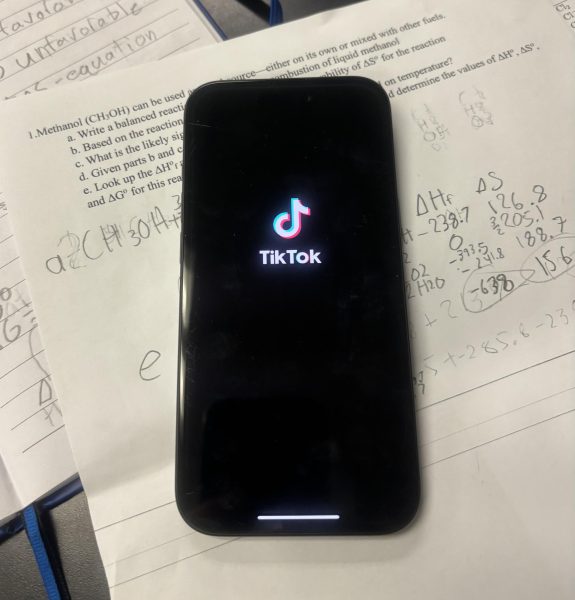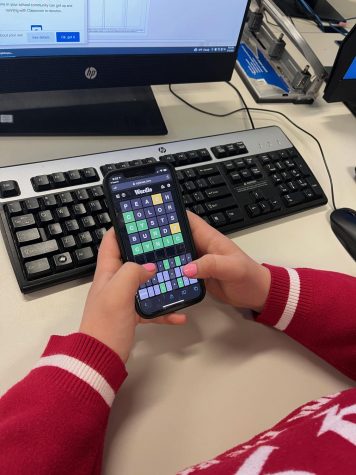Rewired
How technology is changing our brains
Accessibility has allowed us to have screen time all throughout the day – even right before when our brains should be resting
Technology has become an integral part of our modern world, so in some ways it comes as no surprise that our brains, like our environment, are continually being molded by our exposure to technology. With MRI scans and other observational research, it has been shown that our brains are actively maturing from birth through young adulthood, but exposure to smartphones, computers, and tv is beginning to change the way the latest generation develops their most important muscle. Joseph Colbert, an English teacher and track coach at Triton, sees this in his classroom.

Listen to a Podcast of this article by clicking the Image
Joseph Colbert: Kids today do not have the attention span that they had not all that long ago, 10 years ago. Everybody wants everything, you know, visual, everybody wants everything really fast, um and they want to move on from one thing to the next really quickly. Um, it’s just that the attention span is lacking and you need a strong attention span to read, so it definitely impacts what they’re doing in the classroom.
Downs: Even out of the classroom, involvement in programs such as music and sports create certain pathways in the brain and allow students to develop valuable skills, ones which are beginning to be hindered by the presence of their phones.
Donna Anderson: Hi I’m Donna Anderson. I’ve been teaching here at Triton for 26 years. I’m a Phys Ed teacher, program coordinator for the department, and also coach girls field hockey and assistant coach to boys lacrosse. It’s all about, not only about the physical aspect of I think a healthy brain is is one that gets energy from exercise, but I also think that, um, interacting with other students in a competitive manner, um, physically also with a game that has a number of different dynamics going on at one time, I think it stimulates the brain in a different way than just sitting and reading a book or even studying in the classroom.
Downs: More as a gym teacher, have you noticed that kids have started to change in how they act in gym class or how they perform in gym class since phones have become popular?
Anderson: Well, its funny, they’ve changed in that they can only run three steps and then the cell phone falls out of their shorts , so that’s a little bit annoying. Um,or they try to run fast and they hold onto their pant legs because the phone is all over the place in their pants. Um, so, I think for me it’s frustrating because it would be nice for them to do exactly what phys ed is supposed to do and that is that break from the classroom, that break from now social media, just to get out and play.
Downs: During the teenage years, being involved with things outside of just your phone is extremely important due to the brain development that is occuring throughout this period and beyond – a critical point that Sarah Spinks, author of PBS’s article “Adolescent Brains are Works in Progress,” describes as the “use it or lose” period of brain development as the pathways used through whatever someone is doing – sports, music, theater, studying, and of course, phone use, will create a hardwired pathway in their brain. Triton’s own Dr. Ellen Moore had similar things to say about this time in brain development.
Ellen Moore: My name is Ellen Moore and I am a biology teacher at Triton, I teach Freshman Introductory Biology and I also teach upperclassmen Anatomy and Physiology.
Moore: I can say that the brain develops dramatically over time and some of the most important changes, the most significant changes, take place during adolescence, between – you know, even beyond adolescence, so, um, starting at age twelve through age 25, you have a lot of neuronal reorganization; there’s a massive reorganization of the neurons.
Downs: Looking beyond this generation of teens, the article “Surprising Ways Smartphones Affect Our Brains” by Lynne Peeples from NBC News mentions that Americans touch their phone on average 2,600 times a day, evidence that we, of all ages, may very well may be addicted to our phones. But, how is the addiction affecting us and as many say ‘rewiring’ our brains?
Moore: I think that our behavior has changed because of cell phones and changes in behavior can lead to changes in neurotransmitters in our heads, so the research that I’ve done, me reading different articles and papers, has shown that there is certainly addictive behaviors that come along with using cellphones, right? Many of us have them by our bedside at night, so when we go to bed we’re looking at them, when we wake up we’re looking at them and all day we are looking at them.
Because we are using them so much, some of the studies have shown that neurotransmitters, in particular the gaba neurotransmitter in our brain, the levels have gone up, the levels have gone up with cellphone use. Increased levels of gabba have also been associated with increased anxiety and depression. We have evidence of that anyway because you look at people, you know, they’re more antisocial now, because they’ve got their phone to turn to and they’re obsessed with looking at it so they’re interacting with each other less and they’re really not gonna have the social skills to be able to maybe work out conflict with other people and express themselves because they’re not used to doing that.
Moore: Cell phones aren’t that old, I mean, cell phones are relatively new to our society, so it’s like when people started smoking, we didn’t know the negative effects it was going to have on the body until many many years later and I still think we are in the beginning stages of cellphone use. We’re not going to know what major effects they have on the body until later but I think we are starting to see signs of it with these studies that are showing changes in neurotransmitters and MRI’s showing that when someone’s on their cell phone, like, their brain is active in different ways then when they are off of the cell phone.
Downs: While we have only started to see the adverse effects of technology, especially technology like phones, which can be carried around with us all day, there are still many positives that come from interaction with our phones and accessibility to our phones. The real question: how can we balance our real lives with our virtual ones?
Anderson: There are some benefits to it right, so you can track your physical activity, so there are some benefits if we are looking at fitness or looking at being active. Um, there’s some benefits to that. So, I don’t want to say that it is 100 percent negative. Within a nanosecond I can contact my entire team by putting out a, a text.
Moore: There is definitely benefits to cell phone use, with communication and safety and many students with learning challenges and so there’s a lot of pluses to it. I think it’s just a matter of, with anything that can be addictive, controlling it.
Downs: Smartphones and other types of technology are not going away, in fact, with Alexa and google home, technology is only becoming more ingrained in our lives. The true hurdle to overcome is not how to do away with technology, but how to balance it in a healthy way so that we can still remain human. Thanks for listening, I’m Jacqueline Downs reporting for the Triton Voice. To find this podcast and more visit tritonvoice.co.
Informational Works Cited
Cooper, Anderson. “Groundbreaking Study Examines Effect of Screen Time on Kids.” 60 Minutes, CBS Interactive, 9 December 2018,
https://www.cbsnews.com/news/groundbreaking-study-examines-effects-of-screen-time-on-kids-60-minutes/
Craig Freudenrich, Ph.D. & Robynne Boyd. “How Your Brain Works,” HowStuffWorks.com, HowStuffWorks, 6 June 2001,
https://science.howstuffworks.com/life/inside-the-mind/human-brain/brain.htm
Peeples, Lynne. “Can’t put down the phone? How smartphones are changing our brains – and lives,” Mach, NBC Universal, 14 December 2018,
https://www.nbcnews.com/mach/science/surprising-ways-smartphones-affect-our-brains-our-lives-ncna947566
Spinks, Sarah. “Adolescent Brains are Works in Progress,” PBS Frontline, WGBH Educational Foundation, 9 March 2000,
https://www.pbs.org/wgbh/pages/frontline/shows/teenbrain/work/adolescent.html
Taylor, Jim Ph.D. “How Technology is Changing the Way Children Think and Focus.” Psychology Today, Sussex Publishers, 4 December 2012,
https://www.psychologytoday.com/us/blog/the-power-prime/201212/how-technology-is-changing-the-way-children-think-and-focus

Hi, my name is Jacqueline Downs, 18, and I am a senior at Triton. While this is my first year in Journalism, so far I have really enjoyed reporting on...








